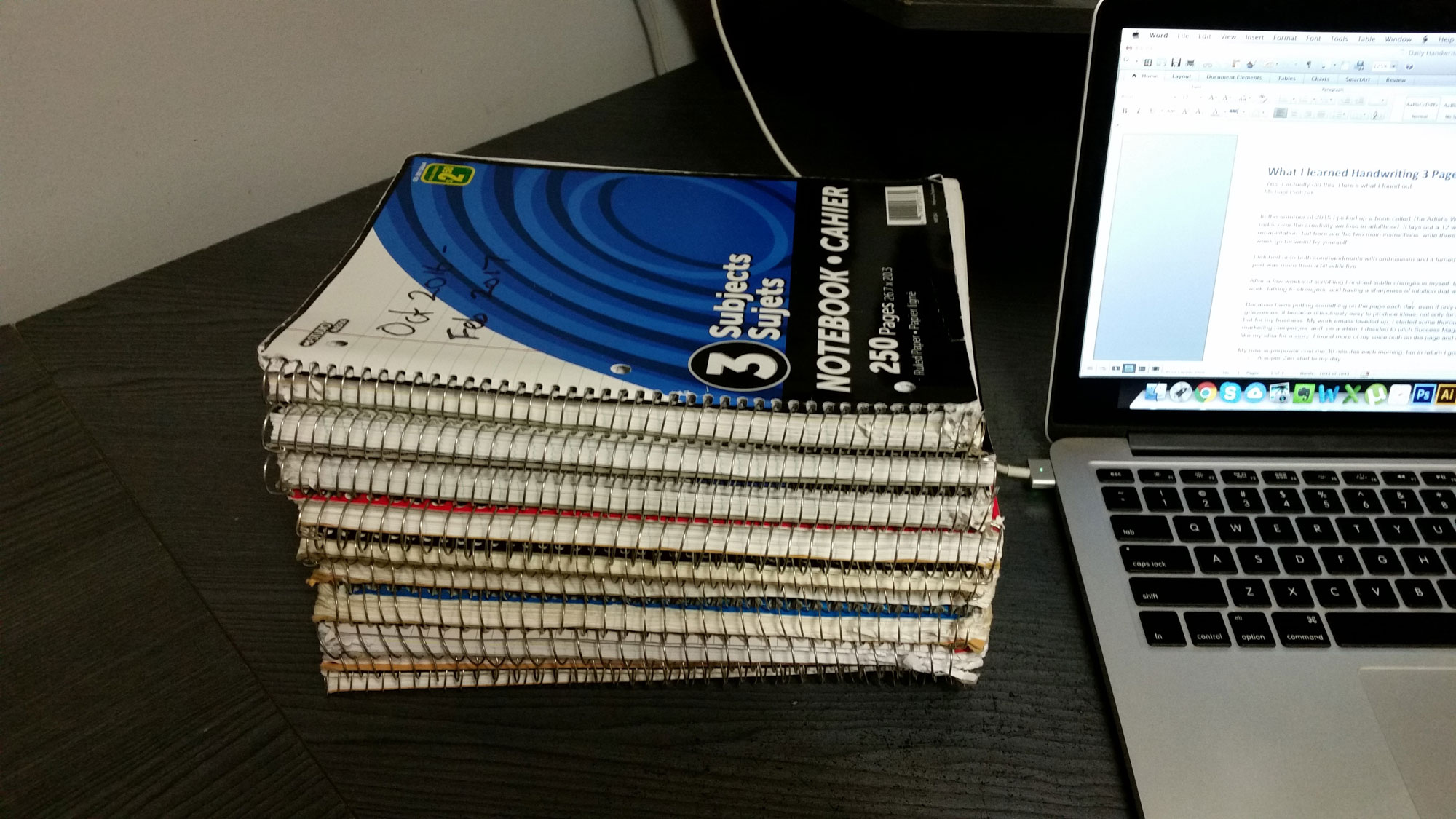In the summer of 2015, I picked up a book called The Artist’s Way, a manual on how to rediscover the creativity we lose in adulthood. It lays out a 12-week course on creative rehabilitation. Here are the two main instructions: Write three pages every day, then once a week go be weird by yourself.
I latched onto both commandments with enthusiasm, and it turned out that the handwriting part was more than a bit addictive.
After a few weeks of scribbling, I noticed subtle changes in myself: taking a different route to work, talking to strangers and having a sharpness of intuition that was entirely foreign to me.
Related: The Benefits of Handwriting
Because I was putting something on the page each day, even if it was only my obnoxious grievances, it became surprisingly easy to produce ideas, not only for my professional writing, but for my business. My work emails leveled up; I started some thoroughly successful marketing campaigns; and on a whim I decided to pitch SUCCESS magazine, who responded to my idea for a story. I found more of my voice, both on the page and in conversation.
My new habit cost me 30 minutes each morning, but in return I got the following:
- A very Zen start to my day
- A chance to purge all unconscious cares from my mind
- A quickness of thought that people around me started to notice
All this while savouring a slow coffee. Not bad.
I’d been journaling irregularly for years on a computer, but it hadn’t resulted in any of these miraculous benefits. I had to ask, what was different? Was I finally going senile? Nope. It turns out there are several psychological principles at work here.
Related: Why You Should Keep a Journal
All Writing Makes You Smarter
Researchers have known for some time about the benefits of writing about our experiences. Laying our cares out, either on paper or the screen, fights depression, leads to fewer doctor’s visits and a healthier immune system. It’s a thinking task, so unlike Netflix, it keeps our brains from gathering dust.
One study followed a group of recently unemployed professionals. The half who kept a daily journal found jobs quicker than those who didn’t write at all.
So why not just hammer away at the keyboard? Journaling on my laptop, I can produce literary gold at least twice as fast as I can with a notepad, after all.
The Science of Pen and Paper
Scribbling your name on a piece of paper is the simplest of tasks, right? Actually, there’s a lot involved. Dr. Marc J. Seifer, a forensic documents examiner, describes it as “the result of a complex interaction of physical and mental processes involving cooperation among your brain’s cognitive, motor and emotion areas, down through the brain stem and the spinal cord, and out to your hand.”
Damn. I’ll never look at my grocery list the same way.
The act of writing increases activity in the brain’s motor cortex, the same thing we observe with MRI machines when someone is meditating. Learning this was an aha moment for me; it explains why after several weeks of my morning pages, I felt calm, centered and mindful.
Related: 28 Ways Keeping a Daily Journal Could Change Your Life
Though I can write faster on a laptop, the research actually suggests the opposite is true. Dr. Virginia Berninger of the University of Washington conducted studies that showed children wrote more, did it faster, and in more complete sentences when using a pen compared to those who typed.
The benefits also apply to adults. When teaching study participants to remember Tamil and Bengali letters, those that wrote them out by hand could recall them better than those who only learned to type them out with a keyboard.
Students taking notes with paper will be happy, too. They generally outperform laptop note-takers. This isn’t surprising, since upper limits on handwriting speed forces the note-taker to paraphrase, whereas the laptop guy is probably taking nearly verbatim notes.
5 Ways to Make Scribbling a Habit
Marie Curie, Charles Darwin, Benjamin Franklin, George Lucas, Frida Kahlo and countless other successful people made journaling by hand a habit.
Consistency requires a lot of discipline, but from my experimentation, I learned there are five things you can do to make it easier:
- Do your writing first thing in the morning. Have a shower and put on the coffee first if you must, but park your butt in the chair before the worries of the day set in and your mind becomes too cluttered or controlled to speak freely.
- Don’t show your morning pages to anyone. The benefits of writing in a stream of consciousness are all but lost if with each word you think, Are they all going to laugh at me? My pages are often repetitive and juvenile, and start with “Here are some words on a page.” I write “blah” a lot when I’m stuck. These words are for you, not the world. No judgment here.
- Try it for a least one month before you decide it’s working. Like meditation, you don’t start to see benefits after your first sitting. The effects seem to be cumulative and exponential. If after the first month you give it up, we can still be friends.
- Write to the bottom of that third blank page. Sure, two pages is at least something, but I’ve found that my greatest insights are often found on that third page, after the point where I thought I couldn’t write another word.
- If you’ve written the same thing seven days in a row, it’s time to take action. One of the most enjoyable parts of this process is that you grow faster. There are only so many days in a row you can complain about the same thing before you take action to fix it. Enjoy your new life!
When we write by hand, we draw ink symbols on a flexible sheet of a recently living tree, in a font no computer can replicate, in words that represent our most intimate thoughts. If this isn’t a sacred process worthy of making a daily ritual, I don’t know what is.
Related: The Stoic Art of Journaling

This is what two years of morning writing looks like.











